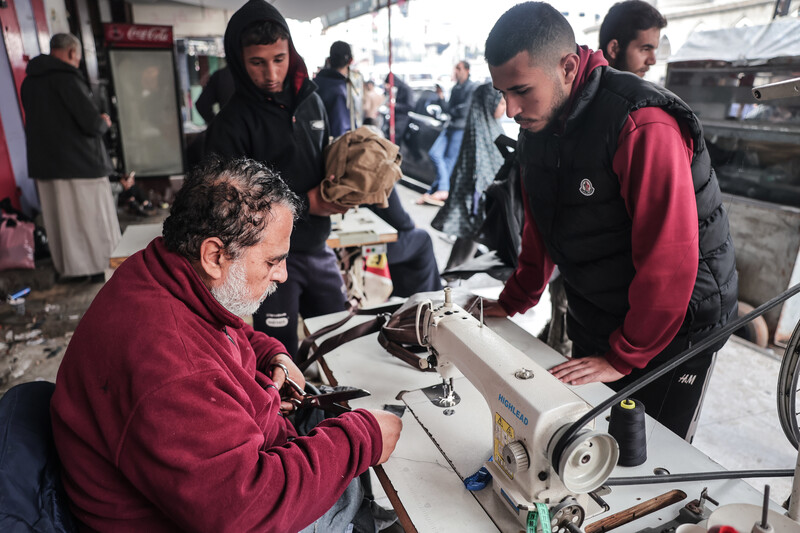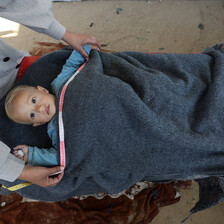The Electronic Intifada 16 January 2025

A tailor mends clothes in Rafah on 27 December 2023. Repurposing old clothes has become a necessity in Gaza where prices have shot up over the past 15 months of an almost complete Israeli closure.
APA imagesThis winter I decided to visit thrift shops in Gaza City, a place where there are no paths left to tread.
I carried the heavy burden of motherhood on my shoulders. My son, Zakaria, 3, needed a warm pair of pants, but my pockets were empty.
I passed by stores selling impossibly expensive new clothes. A winter pajama set for my child cost more than $100! How can a family barely able to secure food even think of such money?
So I turned to the second-hand shops, the refuge of Gaza’s poor, where we search among used clothes for warmth to shield us from the merciless cold.
These shops, where fabrics are pages of unfinished stories, have become a sanctuary for many here. Standing before piles of clothes stacked haphazardly, we sift through a sea of garments that have traveled from distant places – clothes that have lived other lives, perhaps carrying dreams of people we’ll never meet.
I wandered through the heaps, looking for something for my little boy. I found scattered pieces of clothing, mismatched colors, and shapes that didn’t belong together. Yet, I gathered them, like someone piecing together fragments of a dream, hoping to create something meaningful.
I decided to go to the tailor. Perhaps he could stitch these scattered pieces together and make a warm pair of pants for my son.
The tailor was a middle-aged man, with a face weathered by hard times that still did not prevent a smile. I placed the clothes before him and explained what I wanted. He was working on a piece of fabric in his hands, while beside him sat a woman holding a torn dress, speaking in a voice that was barely audible, pleading for its repair.
I noticed how she repeatedly apologized and explained herself, knowing she had no money to pay him for his work. The tailor didn’t seem angry, but he hesitated. I heard him mutter, “I can barely find semolina in the markets. Even bread has become bitter these days.”
I realized his need mirrored hers; both were living the same harsh reality we all endure here.
Something for something
I remembered that I had ground up pasta at home to make semolina. In Gaza, we invent solutions the way poets compose verses. The homemade semolina had given a new taste to desserts we could no longer afford to buy.
“I have semolina,” I told him. “I can give you some if you agree not to charge this woman for her mending.”
He stopped his work and looked at me. For a moment, time seemed to freeze. Then he smiled and agreed.
I left his shop holding my son’s new pants in my hands – a garment made from a patchwork of fabrics, yet imbued with the warmth of all our shared motherhoods and patience. The woman left too, a silent look of gratitude turned my way.
On my way home, I reflected on the strangeness of this life. In Gaza, we redefine things. We give the old a chance to become vital again, turn poverty into resilience and search for fleeting moments of dignity in the tightest corners.
When I got home, my son awaited me with a childlike joy untouched by the cruelty of reality. I dressed him in his new pants. Watching him move freely in his new clothes, I felt as though I had won, even if just for a brief moment, against a world determined to confine us.
Nothing is simple.
The tailor is not just a man who mends clothes; he’s a protagonist in our daily stories.
Semolina is not just a food ingredient; it’s a link in the chain of resistance.
And old clothes are not just fabric – they are poems that tell how we can live and how, even amidst the rubble, we can create beauty.
Saeda Hamdona is a writer in Gaza.





